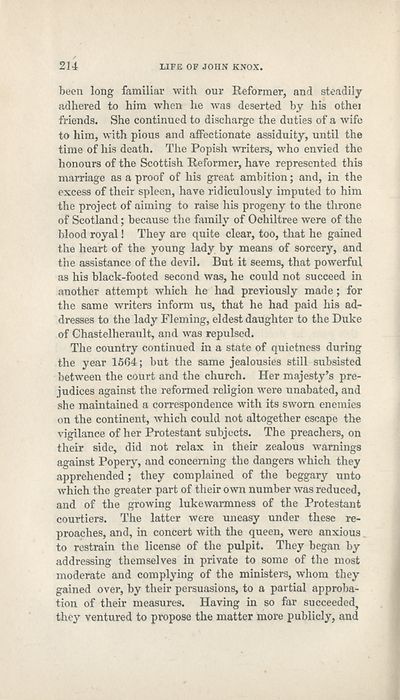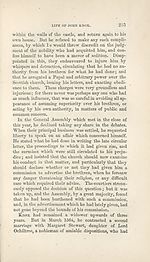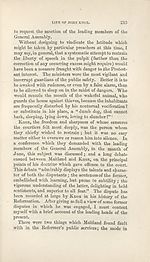Download files
Complete book:
Individual page:
Thumbnail gallery: Grid view | List view

214
LIFE OF JOHN KNOX.
been long familiar with our Reformer, and steadily
adhered to him when he was deserted by his othei
friends. She continued to discharge the duties of a wife
to him, with pious and affectionate assiduity, until the
time of his death. The Popish writers, who envied the
honours of the Scottish Reformer, have represented this
marriage as a proof of his great ambition; and, in the
excess of their spleen, have ridiculously imputed to him
the project of aiming to raise his progeny to the throne
of Scotland; because the family of Ochiltree were of the
blood royal! They are quite clear, too, that he gained
the heart of the young lady by means of sorcery, and
the assistance of the devil. But it seems, that powerful
as his black-footed second was, he could not succeed in
another attempt which he had previously made; for
the same writers inform us, that he had paid his ad¬
dresses to the lady Fleming, eldest daughter to the Duke
of Chastelherault, and was repulsed.
The country continued in a state of quietness during
the year 1564; but the same jealousies still subsisted
between the court and the church. Her majesty’s pre¬
judices against the reformed religion were unabated, and
she maintained a correspondence with its sworn enemies
on the continent, which could not altogether escape the
vigilance of her Protestant subjects. The preachers, on
their side, did not relax in their zealous warnings
against Popery, and concerning the dangers which they
apprehended; they complained of the beggary unto
which the greater part of their own number was reduced,
and of the growing lukewarmness of the Protestant
courtiers. The latter were uneasy under these re¬
proaches, and, in concert with the queen, were anxious.
to restrain the license of the pulpit. They began by
addressing themselves in private to some of the most
moderate and complying of the ministers, whom they
gained over, by their persuasions, to a partial approba¬
tion of their measures. Having in so far succeeded,
they ventured to propose the matter more publicly, and
LIFE OF JOHN KNOX.
been long familiar with our Reformer, and steadily
adhered to him when he was deserted by his othei
friends. She continued to discharge the duties of a wife
to him, with pious and affectionate assiduity, until the
time of his death. The Popish writers, who envied the
honours of the Scottish Reformer, have represented this
marriage as a proof of his great ambition; and, in the
excess of their spleen, have ridiculously imputed to him
the project of aiming to raise his progeny to the throne
of Scotland; because the family of Ochiltree were of the
blood royal! They are quite clear, too, that he gained
the heart of the young lady by means of sorcery, and
the assistance of the devil. But it seems, that powerful
as his black-footed second was, he could not succeed in
another attempt which he had previously made; for
the same writers inform us, that he had paid his ad¬
dresses to the lady Fleming, eldest daughter to the Duke
of Chastelherault, and was repulsed.
The country continued in a state of quietness during
the year 1564; but the same jealousies still subsisted
between the court and the church. Her majesty’s pre¬
judices against the reformed religion were unabated, and
she maintained a correspondence with its sworn enemies
on the continent, which could not altogether escape the
vigilance of her Protestant subjects. The preachers, on
their side, did not relax in their zealous warnings
against Popery, and concerning the dangers which they
apprehended; they complained of the beggary unto
which the greater part of their own number was reduced,
and of the growing lukewarmness of the Protestant
courtiers. The latter were uneasy under these re¬
proaches, and, in concert with the queen, were anxious.
to restrain the license of the pulpit. They began by
addressing themselves in private to some of the most
moderate and complying of the ministers, whom they
gained over, by their persuasions, to a partial approba¬
tion of their measures. Having in so far succeeded,
they ventured to propose the matter more publicly, and
Set display mode to:
![]() Universal Viewer |
Universal Viewer | ![]() Mirador |
Large image | Transcription
Mirador |
Large image | Transcription
| Antiquarian books of Scotland > Scotland/Scots > Life of John Knox ; and, The life of Alexander Henderson > (232) |
|---|
| Permanent URL | https://digital.nls.uk/131835088 |
|---|
| Description | Thousands of printed books from the Antiquarian Books of Scotland collection which dates from 1641 to the 1980s. The collection consists of 14,800 books which were published in Scotland or have a Scottish connection, e.g. through the author, printer or owner. Subjects covered include sport, education, diseases, adventure, occupations, Jacobites, politics and religion. Among the 29 languages represented are English, Gaelic, Italian, French, Russian and Swedish. |
|---|

